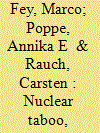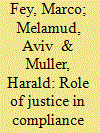|
|
|
Sort Order |
|
|
|
Items / Page
|
|
|
|
|
|
|
| Srl | Item |
| 1 |
ID:
147323


|
|
|
|
|
| Summary/Abstract |
The nuclear age has been characterized by an emerging and now well-established norm of nuclear non-use, the ‘nuclear taboo’. In the realistic and naturalistic setting of the science-fiction TV series Battlestar Galactica, however, nuclear weapons are used frequently and at times massively. Claiming that science fiction can function as an illuminating ‘mirror’ for international relations scholarship and that we can learn something from ‘second-order’ (fictional) worlds, this article explores potential in-show reasons that render the absence of a nuclear taboo plausible within the universe of Battlestar Galactica. We turn to the central pillars of the nuclear taboo in the real world and find them reversed in the show: nuclear weapons are (depicted as) ‘clean’, international institutions are absent, and the enemy is socially constructed as a ‘radical other’, thus rendering the possibility, if not likelihood, of nuclear war plausible. With these insights, we return to our world and argue that, particularly during the years of the George W Bush presidency, the erosion tendencies of the nuclear taboo were indeed quite serious: technological progress and growing political inclination expedited plans to develop usable nuclear weapons, arms control regimes came under considerable strain, and opponents were portrayed as ‘unjust enemies’ or ‘rogues’.
|
|
|
|
|
|
|
|
|
|
|
|
|
|
|
|
| 2 |
ID:
135246


|
|
|
|
|
| Summary/Abstract |
Compliance is a central concept in both the study and practice of international relations, and the body of literature is correspondingly extensive. Although justice has already been shown to play an important role in international negotiations, its potential impact on actors’ compliance behavior has not been sufficiently explored to date. We examine the relationship between the two concepts, and posit that actors’ perceived justice considerations with a regime influence their compliance behavior. To illustrate the importance of including justice considerations in the study of compliance, we investigate Germany’s behavior as a member of the Nuclear Non-Proliferation Treaty during the 1960–80s. The empirical illustration exemplifies how a member’s justice contentions, borne of an unjust regime, can lead to contested compliance and regime conflict. The case illuminates the need to broaden our understanding of compliance and its complexity in both conceptual and practical terms.
|
|
|
|
|
|
|
|
|
|
|
|
|
|
|
|
|
|
|
|
|